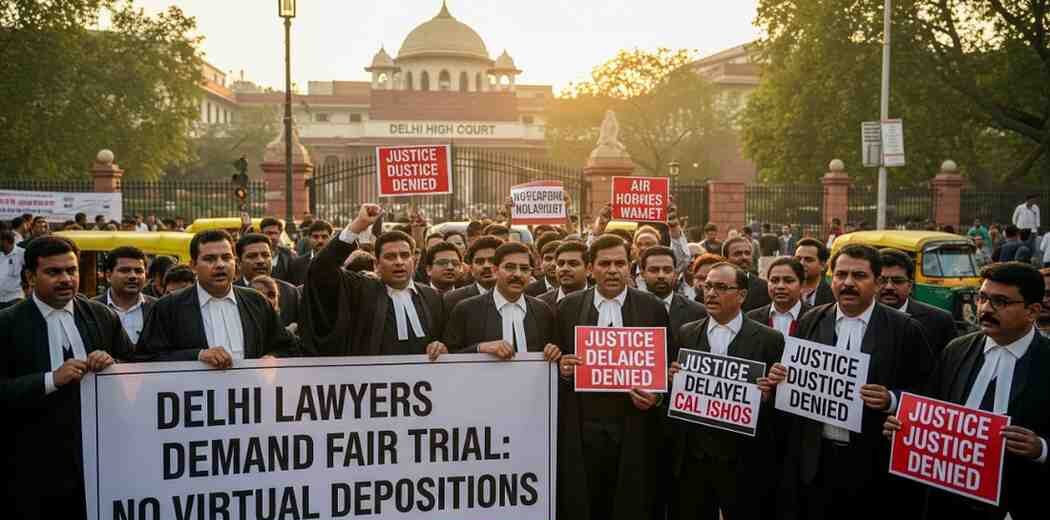Delhi lawyers resume strike against virtual police depositions, demanding physical presence of officers for fair trials. Bar associations reject digital testimony.
introduction
The legal fraternity in Delhi has once again raised its voice against the growing digitalization of court proceedings. Delhi lawyers resumed their strike on Monday, protesting the implementation of virtual police depositions in district courts. The Delhi bar associations argue that this shift threatens the principle of a fair trial in India, despite repeated appeals from the Bar Council of India (BCI) to call off the protest.
Why Are Delhi Lawyers Protesting?
At the heart of the strike lies a fundamental question: Can justice be delivered effectively if key testimonies are given virtually?
- Bar associations in Delhi insist that the physical presence of police officers in court is crucial.
- Cross-examination, they argue, loses impact in a virtual setup where assessing body language, hesitation, or facial expressions becomes difficult.
- Many lawyers believe that allowing virtual witness examination could create loopholes in criminal proceedings and weaken the defense’s ability to challenge testimony.
In short, the lawyers see virtual depositions as a compromise on the adversarial nature of trials, which they believe is essential for justice.
Bar Council of India’s Stand
The Bar Council of India has urged lawyers to call off their strike, emphasizing that technology can help minimize delays, reduce travel, and ease the overall workload. According to BCI, virtual hearings and online testimony can help in:
- Speeding up justice delivery
- Reducing the burden on police officers
- Making courts more efficient in handling backlog cases
Even with these assurances, Delhi’s district bar associations have not been persuaded and maintain their opposition.
Impact on Court Proceedings
Delhi litigants are already experiencing delays as the strike hampers hearings and halts proceedings, leading to concerns about:
- The case backlog is increasing further
- Thousands of litigants are facing uncertainty
- Escalation of the strike across other states if the issue remains unresolved
Legal experts warn that if a middle ground is not reached soon, the dispute could create a bigger disruption in India’s judiciary system.
The Larger Debate: Technology vs. Tradition in Indian Courts
The issue highlights a broader debate within India’s legal framework. Post-COVID-19, courts have widely adopted digital hearings, e-filings, and online procedures, improving accessibility and reducing delays. However, many lawyers maintain that witness examination must remain in person to preserve the integrity of trials.
Balancing technology-driven efficiency with traditional safeguards of justice remains one of the biggest challenges for India’s judiciary today.
Conclusion
The Delhi lawyers’ strike over virtual police depositions is not just a local protest—it symbolizes the wider tension between judicial modernization and the protection of fair trial rights. Unless a consensus is reached between the Bar Council of India and bar associations, litigants may continue to suffer delays in justice.
Frequently asked questions:
Why are Delhi lawyers on strike?
Delhi lawyers are on strike to protest against virtual police depositions. They argue that the physical presence of police officers in court is essential for effective cross-examination and ensuring a fair trial.
What is a virtual police deposition?
A virtual police deposition takes place when a police officer provides testimony in court through video conferencing rather than attending in person. This system is designed to save time and ease logistical difficulties.
What are the lawyers’ main concerns about virtual testimonies?
Lawyers believe that virtual testimonies make it harder to evaluate a witness’s body language, credibility, and consistency, which are crucial during cross-examination. They fear this could weaken criminal defense rights.

























